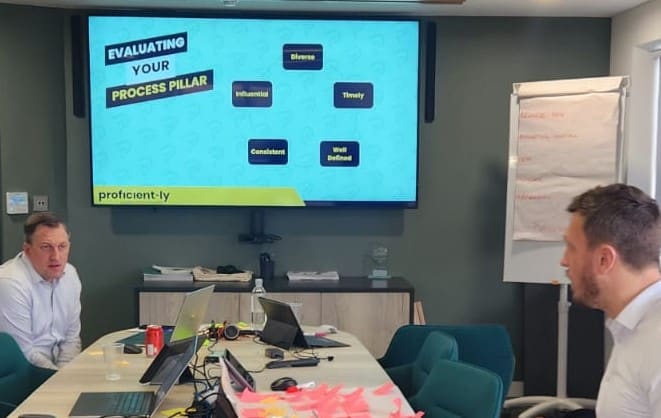Devising and implementing a sales process into your business can be a complex and time consuming task. So why invest the time in creating one in the first place? Let’s take a bit of time to take a look at what a robust sales process can really mean to your business.
Sales Process is all about activity:
Your sales cycle is about the practices and steps that you have in place to turn your prospects into loyal repeat customers. It is a planned and staged process that is made up of a number of ‘contacts’ or sales and marketing activities that lead your client to buy with you. It may be that the stages that you define are as simple as:
Obtain Lead –> Introduce Services –> Arrange Meeting –> Pitch for Work –> Close
However, the possible methods of gaining your clients continued participation at each stage can be multiple. There are many types of communication available to you and there are many styles of message you can send. You also have to account for the likelihood that your message may not stick with the first telling so you need to repeat and reinforce your communication in ways that do not become tedious to your client. Pre-planning a set of sales activities relevant to your client stage in your sales cycle will give you a system to work to and your clients a clear message to receive.
Sales Process as a memory tool:
With all the best will in world we cannot possibly recall every business transaction and interaction. When it comes to their finances most business wouldn’t dream of failing to record a clients payment or not invoicing for monies outstanding, however we regularly fail to record our conversations, meetings and emails with any accuracy at all. Every contact that you have with your prospects and clients is a part of the sales process and if you do not record and track these contacts you fail to remember the type of experience that your client has had with you. In my business we know that if we collect a lead at a networking meeting within a week they will be linked in with us and part of our online network. We know that after every meeting a record of the meeting and any actions will be made on the client file in this office. We don’t have to remember where we met, what we said at the meeting and what our business synergies were they are all noted down. It never fails to impress when 6 months on I can refer to the first meeting and check whether their issues have been resolved.
Sales Process as a people management tool:
A robust sales process is effectively a set of tasks and activities that must take place at a particular time in a particular order to achieve a particular result. With a steadfast set of rules and outcomes like that it is easy to measure success. When you are asking your team to remember and deliver a sales process you are asking them to form a set of habits that will make them and your business more successful. Habits that will have metrics attached to them, i.e. every new client must receive their welcome pack within 24 hours of signing up with you. It is therefore simple for them and you to understand when they are under performing so you can use the steps in the sales process to track your teams’ performance and effectiveness.
Sales Process as a means of control:
How can a sales process help to increase the control you have over your business? Your clients will be forming opinions of your business from the minute that they first become aware of you. Wouldn’t it be sensible to stay in control of this message? Most of us carry out various marketing activities to generate a flow of leads into our business. If we are not then taking control of their experience once they become prospects we are missing sales opportunities. A really good sales process is about making sure that you can clearly influence whether people buy with you. If you can’t, you can never guarantee your success.
Sales Process as a means of analysis:
The activities identified in your sales process are the key activities or key performance indicators (KPI’s) that drive your sales performance forward. These KPI’s will form a fantastic basis for understanding what activities are working and what types of communication your client best responds to. How many calls did you make before you got a meeting? How many people clicked on the link you posted to your blog? How many people referred you last month? You should record and review the numbers through your sales process on a monthly basis. It’ll give you great insight into your business.
Sales Process for relationship building:
How can a sales process help to develop relationships? Forming a relationship with anyone takes time and effort and when it is a business relationship naturally it should be handled with the proper professionalism. Would you spend money with someone on the first day that you met them? Would you bank with a bank whose name you had never heard? Business is done based on relationships and the quicker you make one the better. Using your sales process to help your business contacts to feel they know and can trust you will get you their commitment far faster than letting them learn for themselves. Throughout your sales process you must therefore include activities that provide something useful for your client without always nagging them to buy.
It is clear that your sales process is not just about who is making the sales calls and when. It is about getting right to the core of your businesses productivity and profitability. If you would like more information on how we can support you in building a really robust sales process take a look at our services here.

